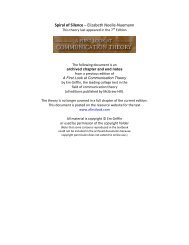Adaptive Structuration Theory of Marshall Scott Poole
Adaptive Structuration Theory of Marshall Scott Poole
Adaptive Structuration Theory of Marshall Scott Poole
Create successful ePaper yourself
Turn your PDF publications into a flip-book with our unique Google optimized e-Paper software.
E-l0 ENDNOTES<br />
10 Randy Hirokawa, "Functional Approaches to the Study <strong>of</strong><br />
Group Discussion," Small Group Research, Vol. 25, 1994,<br />
p.546.<br />
11 Randy Hirokawa and Poppy McLeod, "Communication,<br />
Decision Development, and Decision Quality in Small<br />
Groups: An Integration <strong>of</strong> Two Approaches," paper presented<br />
at the annual meeting <strong>of</strong> the Speech Communication<br />
Association, Miami, November 18-21, 1993.<br />
12 Marc Orlitzky and Randy Hirokawa, "To Err Is Human, to<br />
Correct for It Divine: A Meta-Analysis <strong>of</strong> the Functional<br />
<strong>Theory</strong> <strong>of</strong> Group Decision-Making Effectiveness," paper<br />
presented at the annual meeting <strong>of</strong> the National Communication<br />
Association, Chicago, November 19-23, 1997.<br />
13 Andrea B. Hollingshead, Gwen Wittenbaum, et aI., "A<br />
Look at Groups from the Functional Perspective," in Theories<br />
<strong>of</strong> Small Groups: Interdisciplinary Perspectives, <strong>Marshall</strong><br />
<strong>Scott</strong> <strong>Poole</strong> and Andrea B. Hollingshead (eds.), Sage, London,<br />
2005, pp. 21- 62.<br />
14 See, for example, J. Richard Hackman, "Work Teams in<br />
Organizations: An Orienting Framework," in Groups That<br />
Work (and Those That Don't), J. Richard Hackman (ed.),<br />
Jossey-Bass, San Francisco, 1990, pp. 1- 14.<br />
15 Ivan Steiner, Group Process and Productivity, Academic<br />
Press, New York, 1972, p. 9.<br />
16 Randy Hirokawa, "Avoiding Camels," p. 8.<br />
17 Dennis Gouran and Randy Hirokawa, "Counteractive<br />
Functions <strong>of</strong> Communication in Effective Group Decision<br />
Making," in Randy Hirokawa and <strong>Marshall</strong> <strong>Scott</strong> <strong>Poole</strong><br />
(eds.), Communication and Group Decision-Making, Sage,<br />
Beverly Hills, CA, 1986, p. 82.<br />
18 Randy Hirokawa, "Group Communication and Problem<br />
Solving Effectiveness I: A Critical Review <strong>of</strong> Inconsisten t<br />
Findings," Communication Quarterly, Vol. 30, 1982, p. 139.<br />
19 Cited in Randy Hirokawa, "Researching the Role <strong>of</strong> Communication<br />
in Group Decision-Making: A Functional <strong>Theory</strong><br />
Perspective," paper presented at the annual meeting<br />
<strong>of</strong> the Central States Communication Association, Chicago,<br />
April 11-14, 1991, p. 19.<br />
20 Randy Hirokawa, "From the Tiny Pond to the Big Ocean:<br />
Studying Communication and Group Decision-Making<br />
Effectiveness from a Functional Perspective," 1999 B. Aubrey<br />
Fisher Memorial Lecture, Department <strong>of</strong> Communication,<br />
University <strong>of</strong> Utah, Salt Lake City.<br />
21 Randy Hirokawa, "Group Communication and Decision<br />
Making Performance: A Continued Test <strong>of</strong> the Functional<br />
Perspective," Human Communication Research, Vol. 14,<br />
1988, p. 512.<br />
22 Hirokawa, "From the Tiny Pond to the Big Ocean," p. 6.<br />
23 Ibid.<br />
24 Hirokawa, "Understanding the Relationship."<br />
25 Hirokawa, "From the Tiny Pond to the Big Ocean," p. 11.<br />
26 Gouran, Hirokawa, Julian, and Leatham, pp. 574-579.<br />
27 Robert Craig, "Treatments <strong>of</strong> Reflective Thought in John<br />
Dewey and Hans-Georg Gadamer," paper presented at<br />
the 1994 Convention <strong>of</strong> the International Communication<br />
Association, Sydney, Australia, July 11-15, 1994.<br />
28 John Dewey. How We Think, Heath, New York, 1910.<br />
29 My analysis <strong>of</strong> Habermas' discourse ethics has been<br />
greatly informed by Theodore Glasser and James Ettema,<br />
"Ethics and Eloquence in Journalism: A Study <strong>of</strong> the Demands<br />
<strong>of</strong> Press Accountability," presented to the Media<br />
Ethics Division <strong>of</strong> the Association for Education in Journalism<br />
and Mass Communication, Miami Beach, FL, August<br />
2002.<br />
30 Sonja Foss, Karen Foss, and Robert Trapp, Contemporary<br />
Perspectives on Rhetoric, Waveland Press, Prospect Heights,<br />
IL, 1991, pp. 241-272. (Like all interpreters <strong>of</strong> Habermas,<br />
Foss, Foss, and Trapp refer to his dense writing style. For<br />
that reason, all citations in this ethical reflection are from<br />
secondary sources. For an overview <strong>of</strong> Habermas' thinking,<br />
see Jane Braaten, Habennas's Critical <strong>Theory</strong> <strong>of</strong> Society,<br />
State University <strong>of</strong> New York, Albany, 1991. For a primary<br />
source, see Jiirgen Habermas, "Discourse Ethics: Notes on<br />
a Program <strong>of</strong> Philosophical Justification," Shierry Weber<br />
Nicholsen and Christian Lenhardt (trans.), in Communicative<br />
Ethics Controversy, Seyla Benhabib and Fred Dallmayr<br />
(eds.), MIT Press, Cambridge, MA, 1990, pp. 60- 110.<br />
31 Theodore Glasser, "Communicative Ethics and the Aim <strong>of</strong><br />
Accountability in Journalism," Social Responsibility: Business,<br />
Journalism, Law, Medicine, Vol. 21, Louis Hodges (ed.),<br />
Washington & Lee University, Lexington, VA, 1995, pp.<br />
41-42.<br />
32 Ibid., p. 49.<br />
33 John Cragan and David Wright, "Small Group Communication<br />
Research <strong>of</strong> the 1980s: A Synthesis and Critique,"<br />
Communication Studies, Vol. 41, 1990, pp. 212-236.<br />
34 Cynthia Stohl and Michael Holmes, "A Functional Perspective<br />
for Bona Fide Groups," in Communication Yearbook<br />
16, Stanley Deetz (ed.), Sage, Newbury Park, CA, 1993,<br />
p.601.<br />
35 See John Cragan and David Wright, "The Functional <strong>Theory</strong><br />
<strong>of</strong> Small Group Decision-Making: A Replication,"<br />
Journal <strong>of</strong> Social Behavior and Personality, Vol. 7, 1992 (Special<br />
Issue). Reprinted in John Cragan and David Wright<br />
(eds.), <strong>Theory</strong> and Research in Small Group Communication,<br />
Burgess, 1993, pp. 87- 95.<br />
36 B. Aubrey Fisher, "Decision Emergence: Phases in Group<br />
Decision Making," Speech Monographs, Vol. 37, 1970, pp.<br />
53-66.<br />
37 B. Aubrey Fisher, Small Group Decision Making, 2 nd ed., Mc<br />
Graw-Hill, New York, 1980, p. 149.<br />
38 Dennis Gouran, "Reflections on the Type <strong>of</strong> Question as a<br />
Determinant <strong>of</strong> the Form <strong>of</strong> Interaction in Decision-Making<br />
and Problem-Solving Discussions," Communication<br />
Quarterly, Vol. 53, 2003, pp. 111- 125.<br />
Chapter 18: <strong>Adaptive</strong> <strong>Structuration</strong> <strong>Theory</strong><br />
<strong>Marshall</strong> <strong>Scott</strong> <strong>Poole</strong>, "<strong>Adaptive</strong> <strong>Structuration</strong> <strong>Theory</strong>,"<br />
Conversations with Communication Theorists (video), Em<br />
Griffin (ed.), McGraw-Hill, New York, 2000. The order <strong>of</strong><br />
the second and third sentences is inverted.<br />
2 <strong>Marshall</strong> <strong>Scott</strong> <strong>Poole</strong>, "Decision Development in Small<br />
Groups I: A Comparison <strong>of</strong> Two Models," Communication<br />
Monographs, Vol. 48, 1981, p. 4.<br />
3 <strong>Marshall</strong> <strong>Scott</strong> <strong>Poole</strong> and Jonelle Roth, "Decision Development<br />
in Small Groups IV: A Typology <strong>of</strong> Group Decision<br />
Paths," Human Communication Research, Vol. 15, 1989, pp.<br />
323-356.<br />
4 <strong>Poole</strong>, "Decision Development in Small Groups 1," p. 4.<br />
5 Anthony Giddens, The Constitution <strong>of</strong> Society: Outline <strong>of</strong> the<br />
<strong>Theory</strong> <strong>of</strong> <strong>Structuration</strong>, University <strong>of</strong> California, Berkeley,<br />
1984, p. 14.<br />
6 Robert Boynton, "The Two Tonys: Why Is the Prime Minister<br />
So Interested in What Anthony Giddens Thinks?" The<br />
New Yorker, October 6, 1997, p. 67.<br />
7 Giddens, Constitution <strong>of</strong> Society, p. xvi.<br />
8 <strong>Marshall</strong> <strong>Scott</strong> <strong>Poole</strong>, "Group Communication and the<br />
Structuring Process," in Small Group Communication, 7th ed.,<br />
Robert Cathcart, Larry Samovar, and Linda Henman (eds.),<br />
Brown & Benchmark, Madison, WI, 1996, p. 87. Definition<br />
based on Anthony Giddens, Central Problems in Social The
















